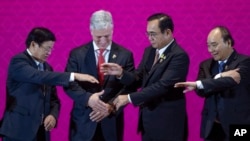Seven Southeast Asian leaders skipped an important meeting with the United States on Monday after President Donald Trump decided not to attend their regional summit in Thailand.
Rather than Trump, the U.S. sent recently appointed national security adviser Robert O'Brien to the Association of Southeast Asian Nations gathering. The move contrasts with other allies of the 10-member regional bloc who sent their heads of government.
Only host Prime Minister Prayuth Chan-ocha of Thailand and the prime ministers of Vietnam and Laos joined O'Brien and the foreign ministers sent by the other countries.
American officials, fearing a boycott, urged all Southeast Asian heads of state to attend Monday's summit. But ASEAN leaders decided to send only Prayuth as host, the Vietnamese prime minister as host of next year's summit and the leader of Laos, who oversees ASEAN-U.S. relations, a Southeast Asian diplomat told The Associated Press on condition of anonymity because of a lack of authority to discuss the issue.
The annual summit allows Southeast Asian leaders to deal as a group with the world's major powers, leveraging their influence in making security and trade arrangements. It has served as an arena of rivalry between Beijing and Washington, which both seek to strengthen their clout in a geopolitically important region.
Trump's decision to skip the summit of heads of state and not send Vice President Mike Pence or Secretary of State Mike Pompeo left a diplomatic vacuum for other global leaders to fill, such as Japanese Prime Minister Shinzo Abe, Indian Prime Minister Narendra Modi and especially Chinese Premier Li Keqiang.
"My guess is the leaders will attend the meetings when their counterparts are here," Philippine Finance Secretary Carlos Dominguez told reporters. "It's just a matter of proper balance."
During the meeting, O'Brien read a letter from Trump, who invited ASEAN leaders to a "special summit" in the U.S. early next year.
ASEAN includes Brunei, Cambodia, Indonesia, Laos, Myanmar, Malaysia, the Philippines, Singapore, Thailand and Vietnam. Together, they comprise a fast-growing regional market of nearly 650 million people.
At their annual gathering, the ASEAN leaders meet in their own summit before meeting separately with their counterparts from outside the bloc, including the U.S., China, Japan, Australia and India.
ASEAN leaders welcomed what they said was the conclusion of seven years of negotiations for a massive free trade deal called the Regional Comprehensive Economic Partnership. Officials, however, said there were still final issues to be resolved by the 16 countries involved in the pact before it can be signed early next year.
Chinese Vice Foreign Minister Le Yucheng said 15 countries involved in the negotiations could completely sort out some remaining issues by year's end and were ready to sign RCEP next year. India is welcome to get on board when it's ready, he said.
India has expressed concerns that its markets could be flooded with Chinese goods under the deal.
RCEP, which does not include the U.S., aims to level trade barriers between ASEAN members and six other countries in a bloc encompassing roughly a third of all global trade.
ASEAN also reported progress in negotiations to craft a so-called "code of conduct" with China that aims to prevent armed confrontations in the disputed South China Sea.
Four ASEAN states — Brunei, Malaysia, the Philippines and Vietnam — along with China and Taiwan, have longstanding territorial conflicts in the sea, a key waterway for global commerce. Dwarfed by China's military, rival claimant states have looked to the U.S. for a counterweight.
During the meeting with his ASEAN counterparts, O'Brien made a swipe at China, saying Beijing was using intimidation to try to stop ASEAN nations from exploiting their offshore resources, blocking access to $2.5 trillion in oil and gas reserves alone.
"These tactics go against the rules of respect, fairness and international law," he said.
"The region has no interest in a new imperial era where a big country can rule others on the theory that might makes right. America is helping our ASEAN friends uphold their sovereignty," he said.
China has long warned Washington not to interfere in territorial disputes it regards as a purely Asian issue. It opposes naval and aerial patrols by the U.S. and its allies in the disputed waters, but American forces have maintained their presence and continued "freedom of navigation" sail-bys designed to challenge China's vast territorial claims.
Le, the Chinese envoy, said he was confident that a regional code that China is negotiating with ASEAN states could be concluded in three years. Responding to a question about O'Brien's comments, he said, "Regretfully, while the tree desires tranquility, the wind keeps blowing. Some non-regional countries have done everything to make trouble and raise tensions. They want to impose their will on our countries," he told reporters.
In addition to national security adviser O'Brien, U.S. Commerce Secretary Wilbur Ross also traveled to Bangkok with a trade mission that is touring the region.
Despite the apparent downgrading of the ASEAN gathering by Trump, U.S. businesses and governments were seeking to emphasize the American commitment to the region with a privately led conference attended by about 1,000 business and government officials.
"The Trump administration is extremely engaged in and fully committed to this region," Ross told the meeting.







